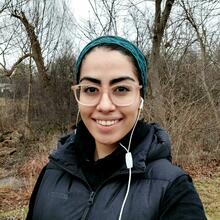Why did you pursue your graduate studies at the University of Waterloo?
I chose to pursue my PhD at the University of Waterloo because the institution has always been known as a pioneer in my field of study, electrical engineering, with very well-known research groups and professors.
 Describe your research and what makes you passionate about it
Describe your research and what makes you passionate about it
Well, my research focuses on the control of high-voltage direct-current (HVDC) systems, which are modern means of transmitting power over long distances in the form of DC electricity rather than the conventional AC form. This technology ultimately aims at converting the traditional power systems' layout to a global "super grid", in which various power systems across the world can be connected to one another to compensate for the excess/deficit of power. Furthermore, using this technology, various renewable energy sources can be integrated into the existing power systems, converting the carbon-intensive electricity system into a system with high penetration of renewable energy sources.
I am passionate about my research because of the long-term benefits that my research and other similar studies will bring to the global society in terms of providing sustainable and clean energy for customers with limited or even no access to electricity.
Tell us about where you are from
I am from Iran. I completed my undergraduate and master's education in electrical engineering at the University of Tehran.
What is the best part about being a grad student?
To me, developing the skills to become an independent researcher, multitasking, and working/meeting with professional people in your research area would count as the best parts of being a grad student.
What campus services have you accessed and how have they been useful to your academics or your well-being as a student?
Some academic services I have accessed are the Library, the Writing and Communication Centre, the Centre for Career Action, and Immigration consulting in the Student Success Office. I have found all of them to be an asset and a trustworthy source of information whenever I needed them.
As for well-being services, I usually use the available workout spaces in the Physical Activities Complex and the Columbia Icefield and also take part in the social and wellness events arranged by the Graduate Student Association - University of Waterloo or by Women in Engineering. These activities have really been effective in boosting my mental health even more than my physical health.
How has grad school helped you develop your teaching skills?
I was lucky to serve as a TA for several courses that I loved and was an expert at. The interactions I had with the instructors and the students helped me to improve my teaching skills significantly.
How do you spend your free time?
I am pretty busy in my leisure time and usually, I have a lot on my plate. To me, nature has always been pleasing and comforting, so whenever I get some free time, visiting a natural area is my first preference. I either go hiking or running in these places, which are my activities of interest. Also, playing piano, reading books, and hanging out with my friends count as the main activities I do in my free time.
What advice do you have for new graduate students?
The best advice I can give a new grad student is to accept all the challenges in their path with open arms and look at them as an opportunity to learn and grow.
What are your plans once you finish your education?
My preference is to apply for a job in the industry and work as a professional engineer. I would love to work as a member of a passionate team and use all the skills I have learned over the past several years, but nothing is certain, let's see what is waiting for me down the road.
What are some of the challenging aspects of being a graduate student and how do you address these challenges?
I think with the huge amount of personal and professional investments a grad student makes in their education, stress management can be a significant challenge. To alleviate it, I personally choose to be consistent and not to expect instantaneous “rewards”. PhD research takes time, and I do not believe there is such a thing as failure. Just being consistent and having short-term/long-term plans helps to manage the level of stress.
Country of origin: Iran
Domestic or International: International
Academic stream: Research
Full-time or part-time: Full-time
Research supervisor: Sahar Pirooz Azad
Graduate student awards held: International Doctoral Student Award, Provost Doctoral Entrance Award for Women
TA/RA or GRS held: GRS




